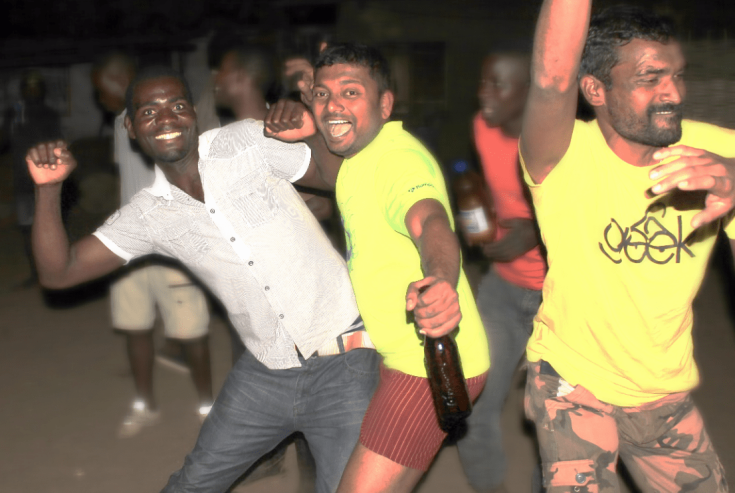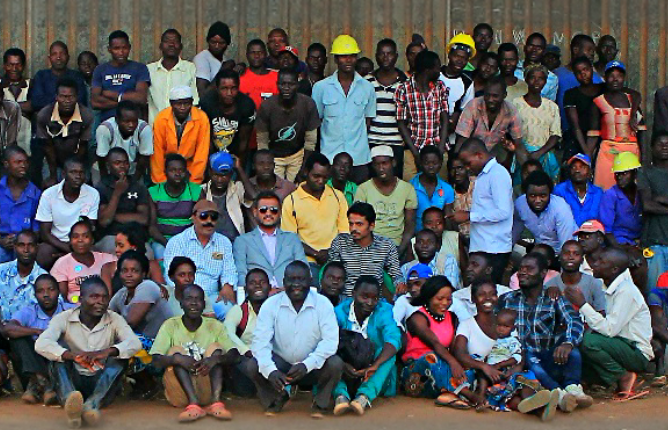Ein guter Freund von mir, Rohan, hat sich bereit erklärt auch einen Gastartikel zu meinem Blog beizusteuern. Hier seine Erfahrungen, die er in mehr als zwei Jahren als Bauunternehmer in Malawi sammeln konnte:
Moving to a new continent always bring challenges in everything ranging from food, shopping, culture and many other things. My first visit to Malawi was in April 2017. I landed at night and was assigned to my workplace in Salima, a small sleepy town near Lake Malawi.
My workplace was 35 km from the town on the shores of Lake Malawi which was by far the biggest freshwater lake seen by me yet. I was mesmerised and immediately fell in love with it. While enjoying the scenic beauty of Lake Malawi I realised that the local fishermen had stopped all their work and were continuously staring at me. The women had children tied to their back and had stopped in their tracks. The children were trying to come close and wanted to pump-fist but were scared. I was just trying to ignore them but the more I was ignoring them, the more curious I was to understand these people, their culture, their habits and everything about them. There started my fun filled and memorable journey with the Malawians of which I would like to share a couple of experiences with you.
What is Happiness?
People in Salima are living way beyond poverty line. The salary is around $1 per day but most of the people don’t even have a job. Their basic source of income comes from fishing and selling these fishes at the local market. Some other locals are engaged in maize farming which they do only once a year during rainy season (November till March).
Very rarely can you see a house which has iron sheets on the roof. It is a privilege for any person to have iron sheets for roofing and a personal bicycle which is usually referred as their lifetime earnings and that person is called as a “Rich man”.
I was once questioned by a person: ‘Bwana (=Boss), what is the average interval between 2 meals for you?’ I was taken a little aback by this question and dismissed it as a stupid question as we never think of things like that but the person was persistent on knowing the answer. So, I replied: ‘I have food three times a day like everyone else. Breakfast, Lunch and Dinner.’ The guy looked at me shockingly with his jaw open and big eyes. On asking him about the issue he said: ‘Me and my whole family or rather my entire village eat one meal in two or three days!’ Now it was my turn to be amazed. I was completely speechless not just because they don’t eat but with the way they have resigned themselves to the fate thinking that this is life and nothing better can happen.
The best part which I like about Malawians is that they are happy even though they are poor and the country is underdeveloped. They live in the moment and never think what is going to happen next. Maybe that’s the reason they are at peace and content. Meanwhile, we have been whining all our life as we were taught from an early age about education, job, career, etc. We embark on the journey and try to excel in all these things hoping that good moments are just a little ahead and yet the struggle continues till the very end. But these people live like they have nothing to gain and nothing to lose.

Dance and Malawians – ‚Dance like nobody is watching‘
Whenever the words ‘Dance’ and ‘Africa’ come together, everyone has a frame in their mind and we tend to picturise African people wearing animal skins dancing around the fire and shouting. Well, even I thought the same until I came to Malawi but the reality was totally distinctive.
One fine day I was free with no workload so I decided to visit the local market and see if anything new can be understood and it turned out to be a memorable experience. We decided to use the local transport. After 15 minutes I found myself sitting on the carriage of a “Njinga” (= bicycle taxi) holding some welded handle. It was a bumpy ride due to lack of shock absorbers and dirt road. When we reached the nearby village we found the place to be very noisy. There were huge loudspeakers on the side of the main road and people were dancing. I asked one of the shopkeepers if there is a special occasion that the people are dancing in the morning and he replied that this is how they spend every morning, every day. It was their daily routine.
Coming back to their style of dancing, well, it looked funny and weird but within sometime I started to blend in and started to like the music as well as the way these people danced. It was not a break dance or tap dance or hip-hop or ballet. It was a mixture of everything, a fusion of all the forms of dance. There was no pattern or anything, they just danced. My interest was at the peak by then and my mind made me think how this type of dance can be so alluring when there is no pattern or no synchronisation or anything. At that moment I realised what made it beautiful. These people danced for themselves and not for others to judge and appreciate.
They danced to EXPRESS and not to IMPRESS. They were so much into the music that they didn’t care about anything else. It felt like they were connected with something else rather than worry or think about the materialistic world. I really felt honoured to have witnessed something like that but the bumpy ride on the way back brought me back to my senses.

Astonishing ‘Cuisine’ diversities
Once, I had to attend a meeting where all the directors of a company were in a conference along-with all their senior staff. Due to some issues I reached late and when I reached in the conference hall I saw many gloomy faces with some serious topic going on:
Managing Director (M.D.): ‘What the f*#k are you doing when the mice are eating all the crops in the warehouse? Tell me what have you planned and what is your strategy?’
Officer-01: ‘Sir, we have placed an order for mouse traps to the Purchase Department.’
Officer-02: ‘Boss, we have ordered some medicines that can kill these rats.’
The M.D. was totally furious because he was suffering an economic loss and there seem to be no quick solutions. Meanwhile, I saw a local guy who was serving us coffee. He had followed the conversation and begged to speak a few words which might help to resolve the issue. He was granted a chance and this is how he goes:
Local Guy: ‘Sirs, I thank you all to give me chance to speak and I really consider this an opportunity to do something for the company which has given me a lot and blah blah …’
Officer-01: ‘Come to the point!’
Local Guy: ‘Sorry, Bwana. I request you to let me employ three local people [that’s $3/day!] and I would make sure that your mice problem is solved within a week!’
We were wondering what he is going to do but the M.D. granted him some money if he would solve the problem within a week. He solved the problem in five days. I once had a chance to talk with him so I asked him:
Rohan: ‘What did you do?’
Local Guy: ‘Boss, my people here do not eat for two days if they get an opportunity to eat many mice, do you think that they are going to leave it? They did it for free. I just wanted to $3/day for a week to feed my family and now I got even more. Hallelujah.’

Language Barrier
Whenever you go to any non-English speaking country you are going to face a language barrier but in Salima it seemed to be even higher due to lack of educational facilities and poverty.
I needed to adapt to this situation by using all the three ways of communication: spoken words, hand and facial gestures as well as paper and pen for drawings. Because of the fact that Malawians are really polite they will never reply with ‘No’ even if they did not understand a single word. Especially at work they will always reply: ‘Yes, Yes Boss.’ because they’re also afraid to lose their job. Therefore if you have to tell an employee to go to the bus stand to deliver a certain package and then go to the market to buy some bread and bring some stuff on the way back, do not tell him all these things at once and make sure he understood. It is not like they don’t try, they do but you are probably the only person talking English to them since a long time, maybe since primary school.
Finally I would like to share a communication between one of the Civil Foreman and a Backhoe Loader Operator, both Malawians. I had instructed the Foreman to finish excavation for a pipeline trench as we had to start laying pipes the following day. I asked him about what he understood and he repeated it correctly. Then he went to the operator and shouted: ‘NOT EXCAVATION IS GOING ON IS YESTERDAY’ and the Operator (of course) replied ‘YES BOSS.’ I am still trying to understand what exactly he said or what exactly it meant but at the end of the day the work was completed.



Hinterlasse einen Kommentar